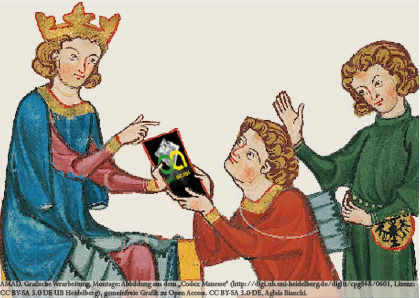AMAD
„Archivum Medii Aevi Digitale - Interdisziplinäres Open-Access-Fachrepositorium und Wissenschaftsblog für Mittelalterforschung‟Zur Einreichung

Langanzeige der Metadaten
| DC Element | Wert | Sprache |
|---|---|---|
| Mitwirkende | Kramer, Alan | - |
| Mitwirkende | Jones, Heather | - |
| Mitwirkende | Keene, Jennifer | - |
| Mitwirkende | Horstkemper, Gregor | - |
| Mitwirkende | Janz, Oliver | - |
| Mitwirkende | Apostolopoulos, Nicolas | - |
| Mitwirkende | Nasson, Bill | - |
| Mitwirkende | Daniel, Ute | - |
| Mitwirkende | Gatrell, Peter | - |
| Mitwirkende | Janz, Oliver | - |
| Autor*in | Kieser, Hans-Lukas | - |
| Datum | 2014 | - |
| Quelle | https://doi.org/10.15463/ie1418.10512 | - |
| URI | https://www.amad.org/jspui/handle/123456789/109693 | - |
| Beschreibung | The Ottoman Empire was the most religiously diverse empire in Europe and Asia. Macedonia, the southernmost Balkan regions and Asia Minor, which formed historically and in the minds of late Ottoman elites the territorial core of the empire, housed large groups of Christians and a significant number of Jews; there was no clear Muslim majority. Struck by an existential crisis beginning in the late 18th century, the Ottoman state undertook reforms, declared the equality of its subjects, willingly maintained its diversity and even institutionalised the cultural and religious autonomies which it had given its Christian and Jewish communities. When the Ottoman state failed to defend its territory and sovereignty, the Young Turk Committee of Union and Progress (CUP), the revolutionary rulers who gained power in a coup, finally decided on a program of national homogenization in Asia Minor which it carried out in 1914-1918. The CUP classified the Ottoman populations and dealt with them through resettlement, dispersion, expulsion and destruction – depending on the populations' assimilability into a Turko-Muslim nation in the Anatolian core. It judged the Muslims, in particular the Kurds, assimilable, but the Christian groups non-assimilable. | - |
| Sprache | eng | - |
| Rechte | This text is licensed under Creative Commmons Licence ([http://creativecommons.org/licenses/by-nc-nd/3.0/de/deed.en_GB Attribution-NonCommercial-NoDerivs 3.0 Germany-CC BY-NC-ND 3.0]) ; Download ; http://creativecommons.org/licenses/by-nc-nd/3.0/de/deed.en_GB - Metadata is licensed under Creative Commons Licence CC0 (http://creativecommons.org/publicdomain/zero/1.0/legalcode CC0 1.0 Universal) ; Text ist lizensiert unter Creative Commmons Licence (http://creativecommons.org/licenses/by-nc-nd/3.0/de/deed.en_GB Attribution-NonCommercial-NoDerivs 3.0 Germany-CC BY-NC-ND 3.0) - Metadaten unter Creative Commons Licence CC0 (http://creativecommons.org/publicdomain/zero/1.0/legalcode CC0 1.0 Universal) | - |
| Schlagwörter | genocide | - |
| Schlagwörter | rape | - |
| Schlagwörter | forced migration | - |
| Schlagwörter | other | - |
| Schlagwörter | politics | - |
| Schlagwörter | law | - |
| Schlagwörter | resistance and revolutions | - |
| Schlagwörter | revolutions | - |
| Schlagwörter | combatants | - |
| Schlagwörter | paramilitary forces | - |
| Schlagwörter | volunteers | - |
| Schlagwörter | public opinion | - |
| Schlagwörter | propaganda | - |
| Schlagwörter | domestic | - |
| Schlagwörter | Late Ottoman population groups | - |
| Schlagwörter | Demographic engineering | - |
| Schlagwörter | Turkism | - |
| Schlagwörter | Talat Pasha | - |
| Schlagwörter | the media | - |
| Schlagwörter | Osmanisches Reich | - |
| Schlagwörter | Weltkrieg [1914-1918] | - |
| Schlagwörter | Minderheit | - |
| Schlagwörter | World War | - |
| Schlagwörter | 1914-1918--Turkey | - |
| Schlagwörter | Minorities | - |
| Schlagwörter | society | - |
| Schlagwörter | social groups | - |
| Schlagwörter | refugees | - |
| Schlagwörter | everyday life | - |
| Schlagwörter | civilian war experience | - |
| Schlagwörter | famine and starvation | - |
| Schlagwörter | crime and discrimination | - |
| Schlagwörter | political violence | - |
| Schlagwörter | religion and ethics | - |
| Schlagwörter | religious institutions | - |
| Schlagwörter | warfare and the military | - |
| Schlagwörter | crimes | - |
| Schlagwörter | atrocities | - |
| Dewey-Dezimalklassifikation | 940 | - |
| Titel | Minorities (Ottoman Empire/Middle East) | - |
| Typ | Text | - |
| Typ | Article | - |
| Typ | Artikel | - |
| AMAD ID | 661604 | - |
| Jahr | 2014 | - |
| Open Access | 1 | - |
| Enthalten in den Sammlungen: | BASE (Bielefeld Academic Search Engine) General history of Europe | |
Dateien zu dieser Ressource:
Es gibt keine Dateien zu dieser Ressource.
Alle Ressourcen in diesem Repository sind urheberrechtlich geschützt, soweit nicht anderweitig angezeigt.

